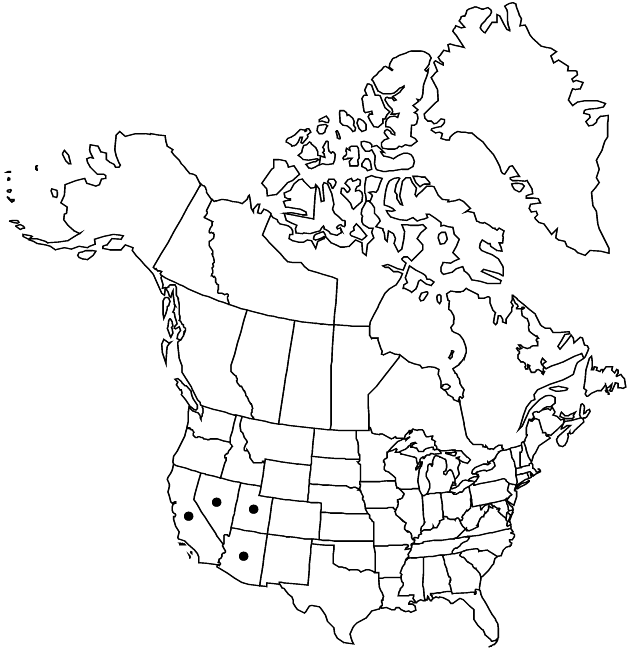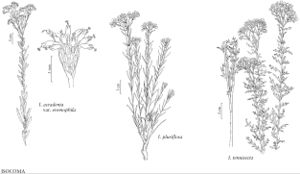Difference between revisions of "Isocoma acradenia var. eremophila"
Phytologia 70: 82. 1991.
Basionym: Isocoma eremophila Greene
Synonyms: Haplopappus acradenius subsp. eremophilus (Greene) H. M. Hall Isocoma acradenia subsp. eremophila (Greene) R. M. Beauchamp
FNA>Volume Importer |
FNA>Volume Importer |
||
| Line 14: | Line 14: | ||
|name=Haplopappus acradenius subsp. eremophilus | |name=Haplopappus acradenius subsp. eremophilus | ||
|authority=(Greene) H. M. Hall | |authority=(Greene) H. M. Hall | ||
| − | }}{{Treatment/ID/Synonym | + | }} {{Treatment/ID/Synonym |
|name=Isocoma acradenia subsp. eremophila | |name=Isocoma acradenia subsp. eremophila | ||
|authority=(Greene) R. M. Beauchamp | |authority=(Greene) R. M. Beauchamp | ||
| Line 32: | Line 32: | ||
|elevation=(-15–)0–900(–1100) m | |elevation=(-15–)0–900(–1100) m | ||
|distribution=Ariz.;Calif.;Nev.;Utah;Mexico (Baja California;Sonora). | |distribution=Ariz.;Calif.;Nev.;Utah;Mexico (Baja California;Sonora). | ||
| − | |discussion=<p>For the most part, var. eremophila is geographically separate from var. acradenia. In southwestern Nevada many intergrades occur; in San Bernadino County, California, the two taxa appear to be contiguous with little or no intergradation. In the latter area, the taxa apparently are at different ploidy levels.</p> | + | |discussion=<p>For the most part, <i></i>var.<i> eremophila</i> is geographically separate from <i></i>var.<i> acradenia</i>. In southwestern <i>Nevada</i> many intergrades occur; in San Bernadino County, California, the two taxa appear to be contiguous with little or no intergradation. In the latter area, the taxa apparently are at different ploidy levels.</p> |
|tables= | |tables= | ||
|references= | |references= | ||
| Line 56: | Line 56: | ||
|publication year=1991 | |publication year=1991 | ||
|special status= | |special status= | ||
| − | |source xml=https://jpend@bitbucket.org/aafc-mbb/fna-data-curation.git/src/ | + | |source xml=https://jpend@bitbucket.org/aafc-mbb/fna-data-curation.git/src/8f726806613d60c220dc4493de13607dd3150896/coarse_grained_fna_xml/V19-20-21/V20_1009.xml |
|tribe=Asteraceae tribe Astereae | |tribe=Asteraceae tribe Astereae | ||
|genus=Isocoma | |genus=Isocoma | ||
Revision as of 16:16, 18 September 2019
Leaf blades mostly 2.5–5 cm, margins pinnately toothed to pinnatifid. Involucres 6–8 m. Phyllary apices usually rounded, sometimes with weakly developed aristae. Florets 12–20. 2n = 12.
Phenology: Flowering (May–)Aug–Nov.
Habitat: Sandy soils, alkaline or salt flats, desert dunes, often with Saguaro-Prosopis-Larrea, Larrea, Atriplex, Yucca, or mixed shrubs
Elevation: (-15–)0–900(–1100) m
Distribution

Ariz., Calif., Nev., Utah, Mexico (Baja California, Sonora).
Discussion
For the most part, var. eremophila is geographically separate from var. acradenia. In southwestern Nevada many intergrades occur; in San Bernadino County, California, the two taxa appear to be contiguous with little or no intergradation. In the latter area, the taxa apparently are at different ploidy levels.
Selected References
None.
Lower Taxa
None.
